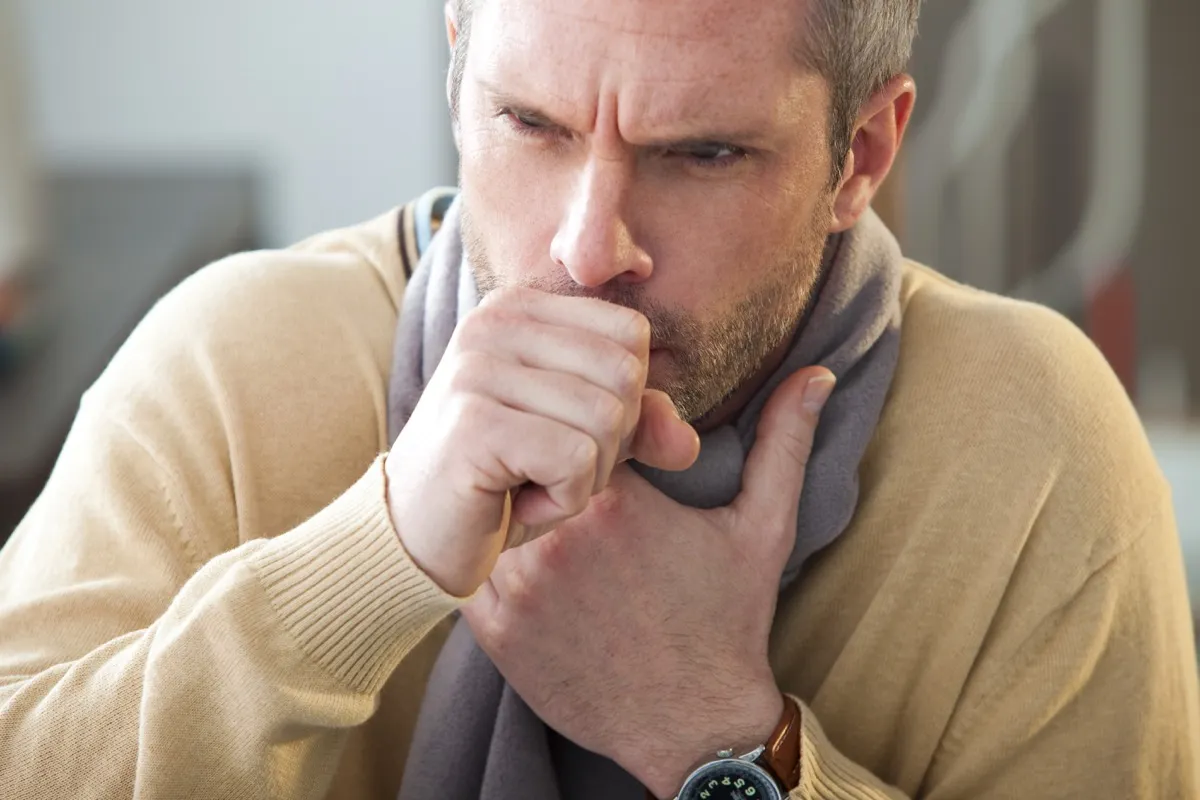“There is a wide spectrum of cough severity in COVID-19, from mild to severe coughs or even severe lung illness. It can be difficult to differentiate between a cough caused by COVID-19 or something else,” says Nate Favini, MD, medical lead at Forward. Though he suggests getting “tested as quickly as possible” if you have a suspicious cough, Favini and other medical professionals explain that there are also a few things to consider when trying to decipher whether your cough is related to COVID or not. Read on to see what experts suggest when identifying where your cough is coming from, and for more on how the virus is spreading, check out Dr. Fauci Says This One Thing Could Spread COVID More Than Anything Yet. Read the original article on Best Life. Throughout the pandemic, the COVID cough has often been described as dry, which “generally means coughing without bringing up phlegm,” says Favini. However, COVID is hardly the only illness that causes a dry cough. “Allergies and gastroesophageal reflux can both cause a dry cough and shortness of breath,” notes Leann Poston, MD, contributor to Invigor Medical. And for more on where the virus is catching on, check out Almost All COVID Transmission Is Happening in These 5 Places, Doctor Says. If you often find yourself with a cough, your current situation may be nothing to worry about. Additionally, “if you are experiencing a cough at a time of year when you typically have seasonal allergies, and it’s accompanied by symptoms like itchy, watery eyes or sneezing, that might make allergies more likely,” says Favini. Sara Narayan, MD, an allergist at Emerson Hospital, points out that there are a few key distinctions between a cough from allergies and a COVID cough: mainly that allergies often make people itchy and they tend to respond to allergy medications. Of course, these two things are not true for COVID. And for one very likely sign you’ve caught the virus, check out If You Have This Symptom, There’s an 80 Percent Chance You Have COVID. Narayan notes that while allergies and COVID have plenty in common, there are a couple of things that differentiate the two, including wheezing. “In patients with asthma, allergies can cause a cough, wheeze, and shortness of breath,” she writes, only two of which are associated with the novel coronavirus. “COVID-19 typically does not cause wheezing.” To see if you have another early red flag, check out This Strange Symptom May Be the Earliest Sign You Have COVID, Study Says.ae0fcc31ae342fd3a1346ebb1f342fcb Another distinction between allergies and COVID? A fever, one of the tell-tale signs your body is responding to a virus. While the flu also tends to come with a fever, according to Narayan, allergies and the common cold usually do not, so at least that rules out two potential illnesses. If your cough is “associated with fever [or] muscle aches … call your health care provider to see if you should be tested for COVID,” Poston warns. And for more useful information on COVID delivered straight to your inbox, sign up for our daily newsletter. There are dozens of symptoms that have been linked to COVID, some of which are seemingly innocuous. But one of the most telling ones is a loss of taste or smell, which is distinctly associated with COVID and not a cold, flu, or allergies. “If you have a cough with other COVID-19 symptoms like … loss of taste or smell, that would increase the likelihood that you have COVID-19,” says Favini. The easiest, most foolproof way to know if your cough is from COVID, though, is getting a COVID test. “Ultimately, because of the spectrum of illness COVID-19 can cause and the prevalence around the country, testing is really needed to determine whether your cough may be COVID-19,” says Favini. “If you’re having a cough, you should act like you have COVID-19 by isolating, wearing a mask, and getting a test.” And for the only safe zone in terms of COVID infection, check out This Is the Only Time Someone With COVID Can’t Get You Sick, Doctor Says.



